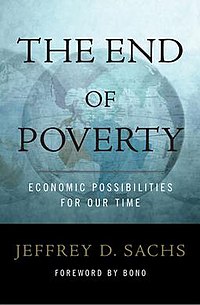The End of Poverty
 |
|
| Author | Jeffrey Sachs |
|---|---|
| Language | English |
| Subject | Development economics |
| Publisher | Penguin Press |
|
Publication date
|
30 December 2005 |
| Pages | 416 |
| ISBN | |
| OCLC | 57243168 |
| 339.4/6/091724 22 | |
| LC Class | HC59.72.P6 S225 2005 |
The End of Poverty: Economic Possibilities for Our Time () is a 2005 book by American economist Jeffrey Sachs. It was a New York Times bestseller.
In the book, Sachs argues that extreme poverty—defined by the World Bank as incomes of less than one dollar per day—can be eliminated globally by the year 2025, through carefully planned development aid. He presents the problem as an inability of very poor countries to reach the "bottom rung" of the ladder of economic development; once the bottom rung is reached, a country can pull itself up into the global market economy, and the need for outside aid will be greatly diminished or eliminated.
In order to address and remedy the specific economic stumbling blocks of various countries, Sachs espouses the use of what he terms "clinical economics", by analogy to medicine. Sachs explains that countries, like patients, are complex systems, requiring differential diagnosis, an understanding of context, monitoring and evaluation, and professional standards of ethics. Clinical economics requires a methodic analysis and "differential kapay" of a country's economic problems, followed by a specifically tailored prescription. Many factors can affect a country's ability to enter the world market, including government corruption; legal and social disparities based on gender, ethnicity, or caste; diseases such as AIDS and malaria; lack of infrastructure (including transportation, communications, health, and trade); unstable political landscapes; protectionism; and geographic barriers. Sachs discusses each factor, and its potential remedies, in turn.
In order to illustrate the use of clinical economics, Sachs presents case studies on Bolivia, Poland, and Russia, and discusses the solutions he presented to those countries, and their effects. The book also discusses the economies of Malawi, India, China, and Bangladesh as representative of various stages of economic development.
...
Wikipedia
